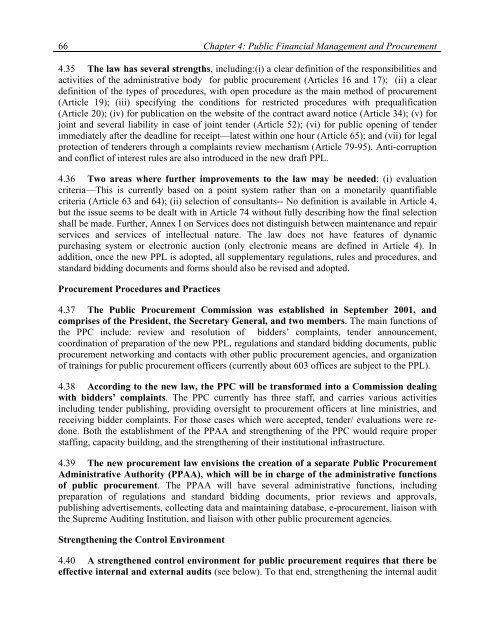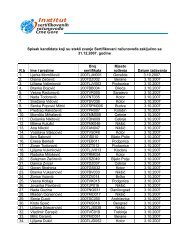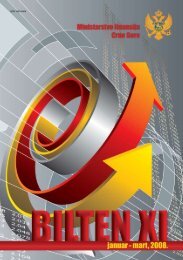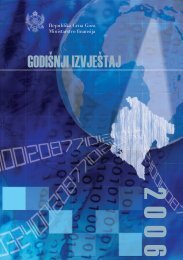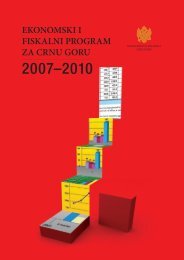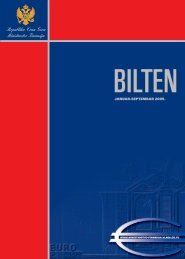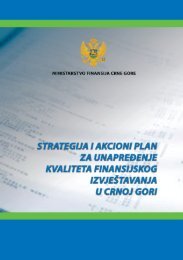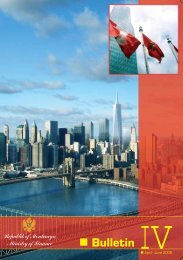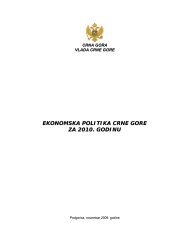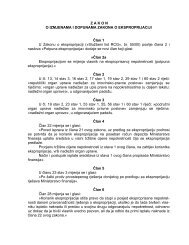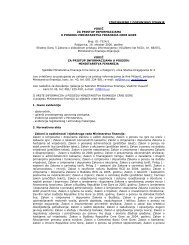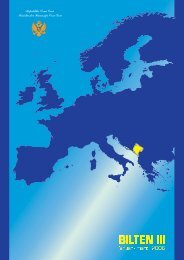Republic of Montenegro: Public Expenditure and ... - Vlada Crne Gore
Republic of Montenegro: Public Expenditure and ... - Vlada Crne Gore
Republic of Montenegro: Public Expenditure and ... - Vlada Crne Gore
Create successful ePaper yourself
Turn your PDF publications into a flip-book with our unique Google optimized e-Paper software.
66 Chapter 4: <strong>Public</strong> Financial Management <strong>and</strong> Procurement<br />
4.35 The law has several strengths, including:(i) a clear definition <strong>of</strong> the responsibilities <strong>and</strong><br />
activities <strong>of</strong> the administrative body for public procurement (Articles 16 <strong>and</strong> 17); (ii) a clear<br />
definition <strong>of</strong> the types <strong>of</strong> procedures, with open procedure as the main method <strong>of</strong> procurement<br />
(Article 19); (iii) specifying the conditions for restricted procedures with prequalification<br />
(Article 20); (iv) for publication on the website <strong>of</strong> the contract award notice (Article 34); (v) for<br />
joint <strong>and</strong> several liability in case <strong>of</strong> joint tender (Article 52); (vi) for public opening <strong>of</strong> tender<br />
immediately after the deadline for receipt—latest within one hour (Article 65); <strong>and</strong> (vii) for legal<br />
protection <strong>of</strong> tenderers through a complaints review mechanism (Article 79-95). Anti-corruption<br />
<strong>and</strong> conflict <strong>of</strong> interest rules are also introduced in the new draft PPL.<br />
4.36 Two areas where further improvements to the law may be needed: (i) evaluation<br />
criteria—This is currently based on a point system rather than on a monetarily quantifiable<br />
criteria (Article 63 <strong>and</strong> 64); (ii) selection <strong>of</strong> consultants-- No definition is available in Article 4,<br />
but the issue seems to be dealt with in Article 74 without fully describing how the final selection<br />
shall be made. Further, Annex I on Services does not distinguish between maintenance <strong>and</strong> repair<br />
services <strong>and</strong> services <strong>of</strong> intellectual nature. The law does not have features <strong>of</strong> dynamic<br />
purchasing system or electronic auction (only electronic means are defined in Article 4). In<br />
addition, once the new PPL is adopted, all supplementary regulations, rules <strong>and</strong> procedures, <strong>and</strong><br />
st<strong>and</strong>ard bidding documents <strong>and</strong> forms should also be revised <strong>and</strong> adopted.<br />
Procurement Procedures <strong>and</strong> Practices<br />
4.37 The <strong>Public</strong> Procurement Commission was established in September 2001, <strong>and</strong><br />
comprises <strong>of</strong> the President, the Secretary General, <strong>and</strong> two members. The main functions <strong>of</strong><br />
the PPC include: review <strong>and</strong> resolution <strong>of</strong> bidders’ complaints, tender announcement,<br />
coordination <strong>of</strong> preparation <strong>of</strong> the new PPL, regulations <strong>and</strong> st<strong>and</strong>ard bidding documents, public<br />
procurement networking <strong>and</strong> contacts with other public procurement agencies, <strong>and</strong> organization<br />
<strong>of</strong> trainings for public procurement <strong>of</strong>ficers (currently about 603 <strong>of</strong>fices are subject to the PPL).<br />
4.38 According to the new law, the PPC will be transformed into a Commission dealing<br />
with bidders’ complaints. The PPC currently has three staff, <strong>and</strong> carries various activities<br />
including tender publishing, providing oversight to procurement <strong>of</strong>ficers at line ministries, <strong>and</strong><br />
receiving bidder complaints. For those cases which were accepted, tender/ evaluations were redone.<br />
Both the establishment <strong>of</strong> the PPAA <strong>and</strong> strengthening <strong>of</strong> the PPC would require proper<br />
staffing, capacity building, <strong>and</strong> the strengthening <strong>of</strong> their institutional infrastructure.<br />
4.39 The new procurement law envisions the creation <strong>of</strong> a separate <strong>Public</strong> Procurement<br />
Administrative Authority (PPAA), which will be in charge <strong>of</strong> the administrative functions<br />
<strong>of</strong> public procurement. The PPAA will have several administrative functions, including<br />
preparation <strong>of</strong> regulations <strong>and</strong> st<strong>and</strong>ard bidding documents, prior reviews <strong>and</strong> approvals,<br />
publishing advertisements, collecting data <strong>and</strong> maintaining database, e-procurement, liaison with<br />
the Supreme Auditing Institution, <strong>and</strong> liaison with other public procurement agencies.<br />
Strengthening the Control Environment<br />
4.40 A strengthened control environment for public procurement requires that there be<br />
effective internal <strong>and</strong> external audits (see below). To that end, strengthening the internal audit


